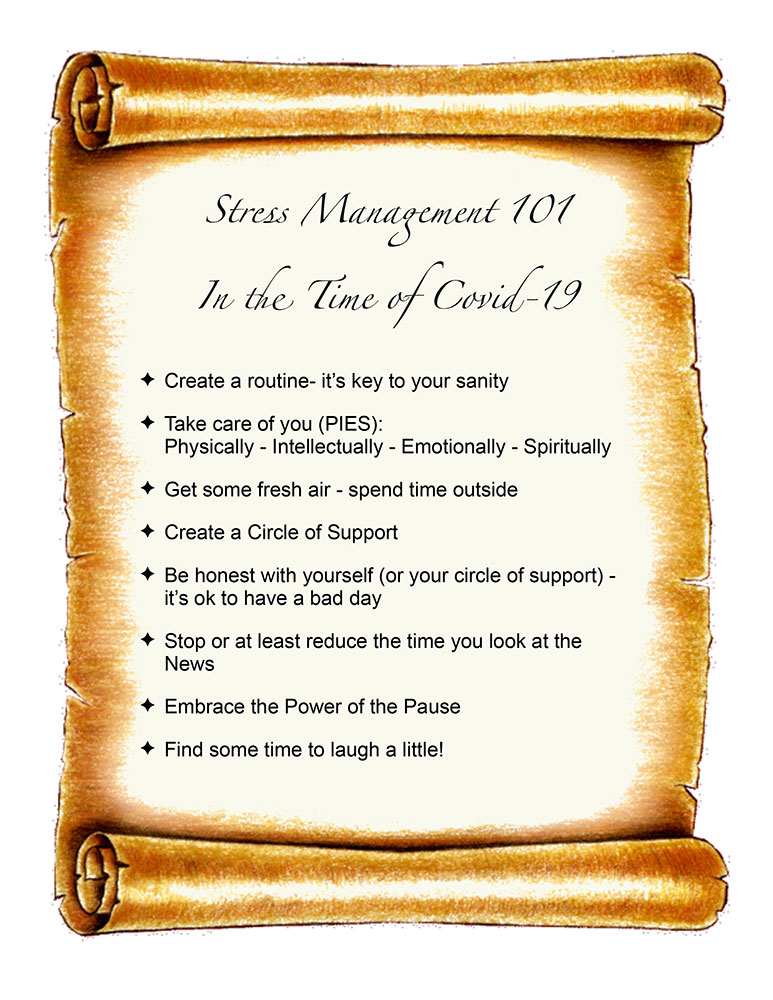Whether you are going into your workplace or working from home, the COVID-19 pandemic has doubtless brought significant changes to your day-to-day life. Fears about the current situation and uncertainty about what the future holds can feel overwhelming.
Everyone has an emotional baseline and reacts differently to stressful situations. Symptoms of anxiety can include excessive worry, fear, increased heart rate, hypervigilance, restlessness, irritability, fatigue, and insomnia, among others, according to the CDC.
Leaders can help their employees manage stress by communicating often, with empathy and concern. Research from the Centers for Disease Control and Prevention (CDC) indicates that when supervisors support workers and encourage efforts to manage work and non-work demands, “workers report lower levels of work-family conflict and improvements to their sleep, schedule control, job satisfaction, well-being, and physical health.”
Stress in these unpredictable times is a natural reaction. We are navigating unchartered waters, making it important to find new ways to work and stay connected while also taking care of our physical and mental well-being. Here are some tips to help you deepen your emotional reserves during this challenging season:
Create a routine – it’s key to your sanity
Take your own emotional temperature and try to anchor yourself in routines as much as possible. Think of ways to keep mentally engaged, whether through work or hobbies. Maintain regular times for sleep and meals. Put time on your calendar to exercise. Use technology to keep up with family and friends.
Take care of you
Wellness means taking care of your physical, intellectual, emotional, and spiritual self – PIES. These components are all integrated and each has an influence on the other. It is easier to manage life’s stresses if you maintain a balance. Even though it is difficult to control unpredictable circumstances in the world, you can control how you react and respond.
Get some fresh air and time outside
Spending time outside can lift your mood and provide an escape from staring at a computer screen. Take a bike ride, spend some time in the garden, or walk to a local park. There’s no wrong way to get outside, and your body and mind will thank you for it later.
Create a Circle of Support
There is strength in numbers and no single person can do everything. Having a circle of support – preferably not family members or business colleagues – can offer benefits in terms of social, emotional, and practical support. Most importantly, this type of support is reciprocal, allowing those in the circle to benefit from the support, whether they are giving or receiving it.
Be honest with yourself (or your circle of support)
It’s ok to have a bad day! Don’t feel pressured to make those around you believe you’re having a good day if you’re not. After all, we are humans and can’t be completely happy at every moment. If it helps, then talk it out. Having a down day can make us appreciate the positive times in our lives that much more.
Stop or at least reduce the time you look at the news
Keep your news consumption measured. With information coming at a breakneck speed, know when to log off, and seek out reputable, science-based sources. Limit the amount of time spent scrolling social media. Schedule device-free times to focus on doing things with your family or pursuing a fun project.
Embrace the power of the pause
We all get busy, tired, or distracted and forget to pause. Making time to pause gives you a chance to focus on the present moment, check in with yourself, and quiet your mind. Mindfulness in action is a great alternative to the illusion of multitasking. Mindfulness can increase effectiveness, decrease mistakes, and even enhance creativity.
Find some time to laugh a little!
We’ve all heard the popular saying, “Laughter is the best medicine.” A funny YouTube video, favorite sitcom, or snarky newspaper cartoon can provide a release from the difficult emotions many of us are dealing with on a daily basis.
There are many things we can do to reduce our anxiety levels. Find the ones that work best for you. Never be afraid to reach out for help. And remember that things will get better if we stay connected.
References
Centers for Disease Control and Prevention. COVID-19 Stress Among Your Workers? Healthy Work Design and Well-Being Solutions Are Critical. 2020; https://blogs.cdc.gov/niosh-science-blog/2020/06/12/covid-19-stress/
American Psychological Organization. Stress Management for Leaders Responding to a Crisis. 2020; https://www.apa.org/topics/covid-19/stress-management

Leave A Comment